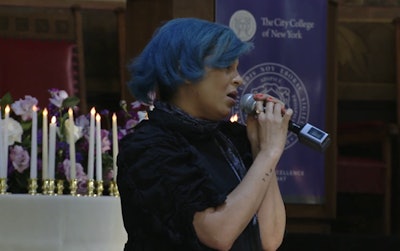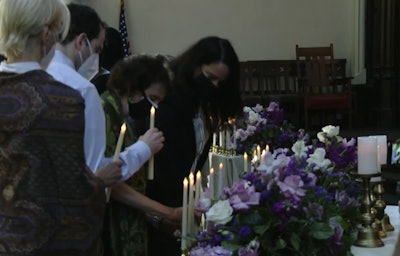 Dr. Vincent Boudreau, CUNY president, greets those in attendance at the Day of Remembrance.
Dr. Vincent Boudreau, CUNY president, greets those in attendance at the Day of Remembrance.
By morning’s end, those empty holders would be filled with tapered candles, placed by the family, friends, and colleagues of the at least 74 members of the City University of New York (CUNY) system who lost their lives to COVID-19.
The Day of Remembrance was held on Tuesday morning, not a week after CUNY celebrated its 175th anniversary.
When the world came to a crashing halt in early 2020, New York City became the epicenter of the crisis. Barely three months into the pandemic, CUNY had already seen some of the highest losses in all of higher education. According to data calculated by Google, Our World in Data, and The New York Times, 68,000 New Yorkers have so far lost their lives to COVID, a fraction of the one million Americans who have died so far.
With no ability to host in person memorials, wakes, or tributes, CUNY built an In Memoriam webpage that launched in late June 2020, listing names and sharing their stories. Since its creation, the page has had over 100,000 visitors, hundreds of whom left messages for loved ones lost.
 Alumni Lee Burgos sings a tribute.
Alumni Lee Burgos sings a tribute.
Dr. Vincent Boudreau, president of City College, welcomed attendees to what he called “the sacred center of this campus.”
In the corners and shadows of Great Hall, in the stairways and along hallways, Boudreau said plaques or marble etchings recall the names of CUNY faculty, students, and staff who gave their lives in the Civil War, the Spanish American war, World Wars I and II, Korea, and Vietnam.
“I don’t know if we’ll have a similar plaque for those we lost in this pandemic,” said Boudreau. “But without question, we are now in the midst of moving toward the tail end of the seminal struggle of our age.”
Boudreau praised the quick thinking and flexibility of faculty, staff, and students to bring instruction online during the early trying months of the pandemic, adding that their hard work kept their institution afloat and, in turn, kept the dreams of its students and forebearers alive.
 Friends, family, faculty, students and staff all gathered to place candles in memory of their lost loved ones.
Friends, family, faculty, students and staff all gathered to place candles in memory of their lost loved ones.
Michelle J. Anderson, president of Brooklyn College, a CUNY institution, was in attendance. Brooklyn College has lost nine individuals to COVID, ages ranging from 31 to 81. They, like many CUNY schools, conducted their own in-person memorial service earlier this year.
“The pandemic took valued members of the Brooklyn College family from us and caused a great deal of suffering,” she said. “However, it also brought the campus together in ways we’ve never seen. We gained a new perspective on what it means to truly be a campus community.”
Anderson said her college stepped up its mental health support in order to help students, faculty, and staff navigate a world turned upside down. The Coronavirus Aid, Relief, and Economic Security Act funds allowed her college to hire four new counselors, including experts in oppression trauma, bereavement, substance abuse reduction, and risk management to oversee treatment of clients at serious risk of harm.
“As difficult as this has been, the pandemic emphasized that Brooklyn College is and will always be a family,” said Anderson. “When someone is suffering, we all share in the suffering.”
In Great Hall, CUNY Chancellor Dr. Félix V. Matos Rodríguez shared some of messages left on their memorial website, sweet memories of love and life cut short. He shared his own heartbreak at the passing of Dr. Allen Y. Lew, who had come to CUNY as their first Asian American vice chancellor just months before the pandemic began.
“In the early months of the pandemic, it seemed constant that we learned crushing news, members of our community falling to this awful virus,” said Rodríguez. “Faculty, who taught and mentored thousands of CUNY students, who left their marks in their research. Students of all kinds of ages, all kinds of dreams. Staff who were the backbones of their campuses.”
Rodríguez also acknowledged that the actual death toll experienced by CUNY is likely larger than 74, and they do not know yet how many alumni in total were lost.
“The U.S. has passed a staggering milestone—one million,” said Rodriguez. “In our eagerness to move forward and get back to normal, it can be too easy to look beyond where we’ve been. We’re in a good moment to reflect on what we’ve learned, and how it has changed every one of us.”
Liann Herder can be reached at [email protected].



















